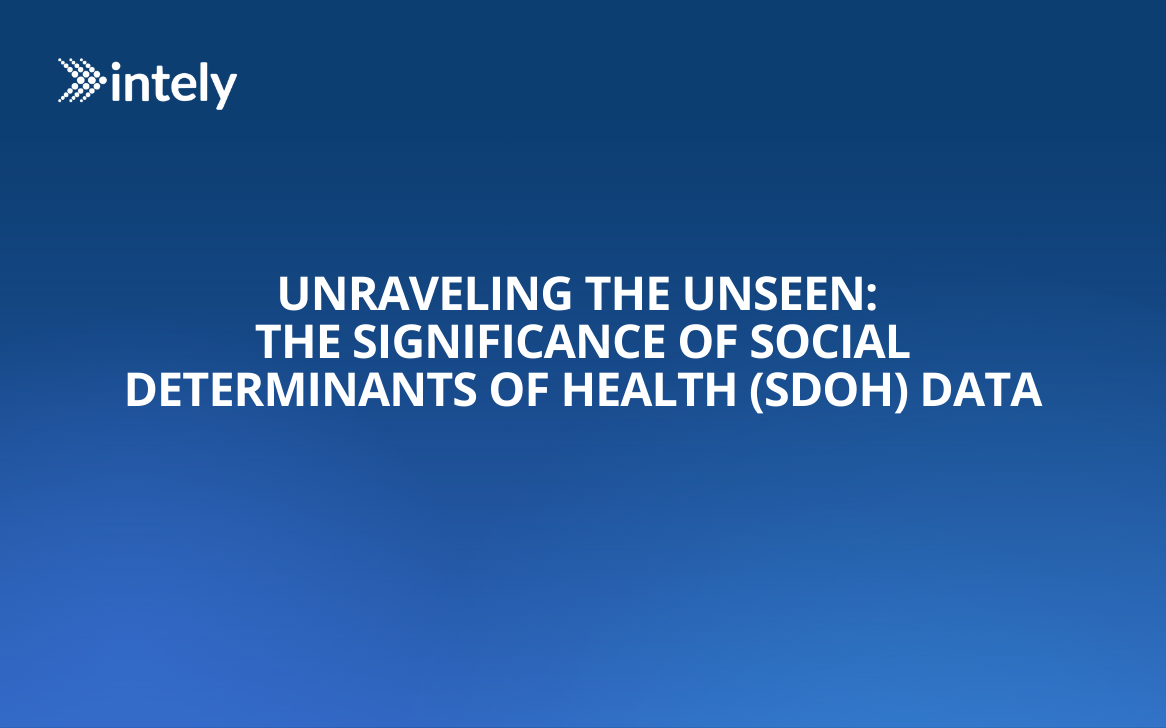What’s New with intely: May Roundup
Here are the highlights of all the content we have posted in the past month. We hope this will give you a sense of what intely is all about, and you'll feel…
"This is a guest post contributed by AnalyticsIQ - blends cognitive psychology with data science to help B2C and B2B organizations." In our ever-evolving…

"This is a guest post contributed by AnalyticsIQ - blends cognitive psychology with data science to help B2C and B2B organizations."
In our ever-evolving healthcare landscape, the importance of understanding and integrating Social Determinants of Health (SDOH) data into our healthcare systems cannot be understated. These determinant factors encompass the conditions in which we grow, work, live, and age and also shed light on broader systemic forces that shape our health and wellness. With studies pointing to a staggering 80% of an individual’s health being determined by factors outside the four walls of a doctor's office, the integration and accurate interpretation of SDOH data has become paramount.
What is SDOH?
Social Determinants of Health (SDOH) refer to the complex interplay of the social, economic, environmental, cultural, and political factors that influence an individual's health outcomes. These factors often exist outside the direct scope of clinical healthcare but encompass various aspects of an individual's life and their surroundings that directly impact an individual’s ability reach their wellness potential.
Examples of key SDOH categories that impact patient health include:
These non-clinical factors profoundly influence individual health outcomes, which is why accessible SDOH data is essential to make healthcare more comprehensive, equitable, and holistic for all.
Imagine a resident in a rural community who has limited access to fresh, nutritious food due to the area being a food desert. Or the patient without reliable transportation who might miss doctor appointments or be unable to pick up medications from the pharmacy as a result. Or even non-English speaking populations who may struggle to interpret medical advice or medication instructions.
When healthcare providers have a comprehensive understanding of a patient’s social circumstances outside the clinical, they are better equipped to offer effective treatments, interventions, and care plans tailored to individual needs. Food deserts could be eradicated through partnerships with grocery brands or distribution services. Transportation restrictions could be eliminated by offering pick up services to those in need. Cultural barriers could be addressed with a better understanding of population race, ethnicity, and language.
Driving this type of change and achieving better outcomes is possible with SDOH data that provides insight into these external factors. However, healthcare providers and the industry as a whole are faced with numerous obstacles when it comes to accessing and leveraging reliable SDOH data.
The Challenge of Capturing Comprehensive SDOH Data
One of the most pressing challenges facing modern healthcare is effectively capturing, integrating, and acting on Social Determinants of Health (SDOH) data within established healthcare systems. While the importance of SDOH is undeniable, its systematic implementation remains plagued with roadblocks including:
As healthcare evolves, the systems supporting it need to evolve in tandem. In the face of these substantial challenges, the silver lining is the growing recognition of the value wide-ranging SDOH data can offer and the creation of solutions specifically designed to help.
External people-based data like that offered by AnalyticsIQ provides comprehensive, scalable, compliant, and predictive insight into an encompassing variety of social determinant categories. By using SDOH data, healthcare providers can gain a full and nuanced understanding of their patient populations and their lives outside the clinic in order to tailor healthcare services to meet specific needs. Leveraging compliant and reliable SDOH data sources like AnalyticsIQ allows healthcare providers to focus on providing the best care possible rather than the hassle of data collection.
With innovations and solutions like Intely integration solutions and AnalyticsIQ’s SDOH data, there's hope that the incorporation of SDOH data into healthcare will transition from being a challenge to a being norm and empower providers to drive better patient outcomes.
Holistic Care Through Informed Decisions
SDOH plays an undeniable role in shaping patient care, treatment plans, and overall health. However, as we've explored, the journey to achieving a comprehensive and actionable understanding of SDOH data is riddled with challenges, from the lack of standardized data collection to trust issues and EHR system limitations. These hurdles, while significant, are not insurmountable. With concerted efforts, innovations like those offered by Intely and AnalyticsIQ, and an industry-wide focus on the importance of this data, we can transition towards more informed, holistic healthcare.
While the road ahead might be paved with challenges, it's also filled with opportunities. Harnessing the power of SDOH data can create a future where every individual receives care tailored to their unique life circumstances. As healthcare providers, policymakers, and data and technology specialists come together, the vision of health equity and informed care for all becomes increasingly attainable.